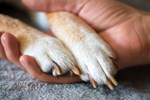French bulldogs more prone to birthing problems than other breeds
French bulldog bitches are 15.9 times more likely to suffer from difficult births (dystocia) than crossbred bitches, according to a series of studies from the Royal Veterinary College (RVC) published today. And, among female dogs that had problems giving birth, French bulldog bitches are then 2.4 times more likely to undergo invasive caesarean sections than crossbred dogs.
Once they have birthing problems, flat-faced (brachycephalic) female dogs overall are 1.54 times more likely to need a caesarean compared with their longer-nosed pure breed or crossbred counterparts, RVC academics also found.
The research, carried out as part of the RVC’s VetCompassTM programme, sought to improve the understanding of common birthing problems (dystocia) in dogs. The academics studied 20,000 bitches that required emergency treatment at 50 Vet Now veterinary clinics between 2012 and 2014. Their findings, published in two papers in The Veterinary Record, highlight the substantial risks that bitches and their puppies face during the birthing process.
According to the first paper, 3.7% of female dogs suffer from dystocia. Alongside French bulldogs, other pure breeds such as Boston terriers, chihuahuas and pugs, are also particularly at risk of birthing problems. Compared to crossbred bitches, Boston terriers are 12.9 times more likely to face birthing issues, pugs 11.3 times more likely and chihuahuas 10.4 times more likely.
The second paper, which examines the effects of difficult births more closely, found that, on average, 25% of puppies and 1.7% of the bitches do not survive problem births. Apart from the risk of death, problem births also mean that many bitches have to undergo painful and invasive surgery, with 48.6% of problem births needing caesarean surgery.
Bulldogs (also known as British Bulldogs), border terriers and golden retrievers were the top three breeds at risk of caesarean section once they have difficulty giving birth. Bulldogs are 7.6 times more likely, border terriers are 4.9 times more likely and golden retrievers are 4.1 times more likely to need the procedure compared with crossbreeds.
RVC veterinary epidemiologist and VetCompass researcher Dr Dan O’Neill said:
“This new research is another piece of evidence suggesting that mankind may have gone too far in modifying dog breed shapes towards extreme conformation that can interfere with basic biological functions. We all need to fall back in love with dog-shaped dogs and move away from the current fascination with extreme-shaped dogs.”
Kennel Club Charitable Trust Chairman Steve Dean said:
“These current findings demonstrate the importance of understanding the risks associated with breeding a litter and the importance of planning a pregnancy carefully to ensure that you fully understand the journey for your dog from conception through to birth and beyond, including some of the potential complications that might be experienced, especially those occurring during the whelping process, as highlighted in this research.
The Kennel Club recognises the rewarding experience of breeding a litter of puppies successfully, nevertheless breeding dogs comes with a fundamental responsibility for supporting the bitch and her puppies throughout the breeding process and this responsibility should not be taken lightly.”
RVC’s VetCompass™ project analyses anonymised veterinary clinical records from over 1,000 UK vet clinics to enhance understanding and improve the health and welfare of all companion animals.
‘Canine dystocia in 15 UK first-opinion emergency-care veterinary practices: prevalence and risk factors’ and ‘Canine dystocia in 50 UK first-opinion emergency-care veterinary practices: Clinical management and outcomes’ are published in The Veterinary Record.
The links to the papers can be found here:
O'Neill, D.G., O'Sullivan, A.M., Manson, E.A., Church, D.B., Boag, A.K., McGreevy, P.D. and Brodbelt, D.C. (2017) 'Canine dystocia in 50 UK first-opinion emergency-care veterinary practices: prevalence and risk factors', Veterinary Record, 181(4), available: http://dx.doi.org/10.1136/vr.104108.
O'Neill, D.G., O'Sullivan, A.M., Manson, E.A., Church, D.B., McGreevy, P.D., Boag, A.K. and Brodbelt, D.C. (2019) 'Canine dystocia in 50 UK first-opinion emergency-care veterinary practices: Clinical management and outcomes', Veterinary Record, http://dx.doi.org/10.1136/vr.104944


